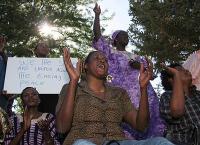VP of Sudan's Tragic Death, Protests Ensue
 Many thousand miles (7) from home, there was a peaceful march to the capitol building to meet with Utah's Governor Jon Huntsman Jr. He has promised to call his contacts in the State Department to investigate this death of Vice President John Garang, who disappeared leaving his office last week making his death suspicious.
Many thousand miles (7) from home, there was a peaceful march to the capitol building to meet with Utah's Governor Jon Huntsman Jr. He has promised to call his contacts in the State Department to investigate this death of Vice President John Garang, who disappeared leaving his office last week making his death suspicious.Utah's Sudanese want death probedThis was not the case, however, in Khartoum. There were violent riots. Thirty-six people "died" Monday.
VP died in a helicopter crash: Anderson and Huntsman pledge support to the marching refugees
By Nate Carlisle The Salt Lake Tribune
About 80 refugees from southern Sudan marched to the Capitol and spoke with Gov. Jon Huntsman Jr. about Sudanese Vice President John Garang, who died Saturday in a helicopter crash near the east African country's border with Uganda.
The Vice President, Mr. Garang, was sworn into office last month. This was part of the peace treaty that had been agreed to last year. This peace treaty was between John Garang's Sudan Peoples Liberation Movement/Army (SPLM/A) and the Sudanese government.
...the crowd sang and chanted messages in Arabic and Dinka mourning Garang and professing Sudanese pride. They carried U.S. and Sudanese flags and signs honoring Garang and requesting United States and international assistance in determining what happened to him.Vice President Garang was opposed to terrorism, which he accused the North of involvement. He was adamant that the leader must go, because of his human rights abuses and support of terrorism.
The Sudanese saw Garang as a symbol of the southern, mostly Christian residents' struggle for rights against the Sudan's northern and mostly Islamic half. Garang commanded a rebel army for more than 20 years, and though a peace agreement is in place, many of the Salt Lake City marchers said they believe he was killed so north Sudan can again begin to marginalize the south.
A "Wall Street Journal" op-ed, reprinted on Sudan Tribune The Bush administration was a moving force behind Africa's most remarkable peace deal. That agreement can be preserved and deepened by keeping a steady hand this week, as Sudanese grief and anger threatens to spill over into renewed conflict.The North and the South were at war for some 22 years. It is remarkable what has been accomplished. There were hopes that Vice President Garang could finally bring peace to war torn Darfur.
When John Danforth was appointed as President Bush's Special Envoy for Sudan four years ago, no Africa analyst gave him a chance of success. The divisions between the Islamist government and the Southerners, mostly Christians and followers of what an old Sudanese constitution nicely called "noble spiritual beliefs," seemed far too deep.
...A Kenyan general, representing a bloc of north-east African countries, led the mediation. The British organized an advisory group of former African guerrillas to help SPLA commanders think through the transition from insurgents to members of a national army, serving alongside former enemies. The Swiss stepped in to help negotiate a truce in the Nuba Mountains, which was then monitored by Norwegians. The World Bank provided technical skills on how to share Sudan’s oil revenue. It’s ad hoc multilateralism.Who knew? Why was the press silent on this issue? Did they believe it would not work, so why bother covering it? Many questions have to be asked.
Many human rights groups have been up in arms about this topic and these people in Darfur. They had a right to know. The press does not get to determine what "news" they are going share with their public. I'm quite sure many of us turned off the TV everytime Michael Jackson's face came on the screen, but this was big news?
The Bush administration has rightly resisted the siren calls for regime change, knowing that the alternatives would likely be no better, and that chaos would be worse. They have been building the ladders, not feeding the snakes. Activists criticize the ethics of dealing with a brutal government. They have kept Sudan in the spotlight. But it is patience and compromise — the needlework of diplomacy — that will deliver peace.I must be one of the first to say, "I apologize, President Bush. I criticized you unrelentlessly. I only wish you would talk more."
This must be investigated. Many believe he was murdered after he was kidnapped. There will not be peace as long as there is doubt in the hearts and minds of so many.

<< Home